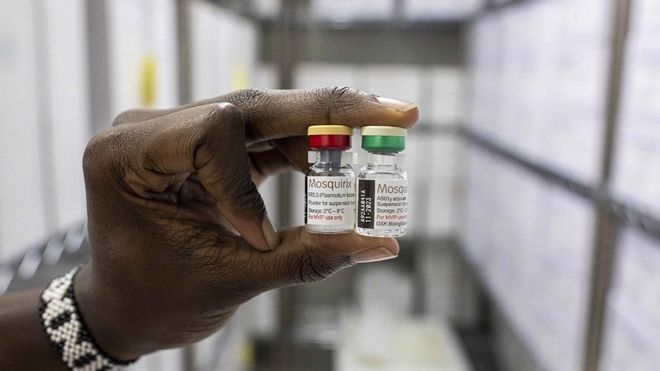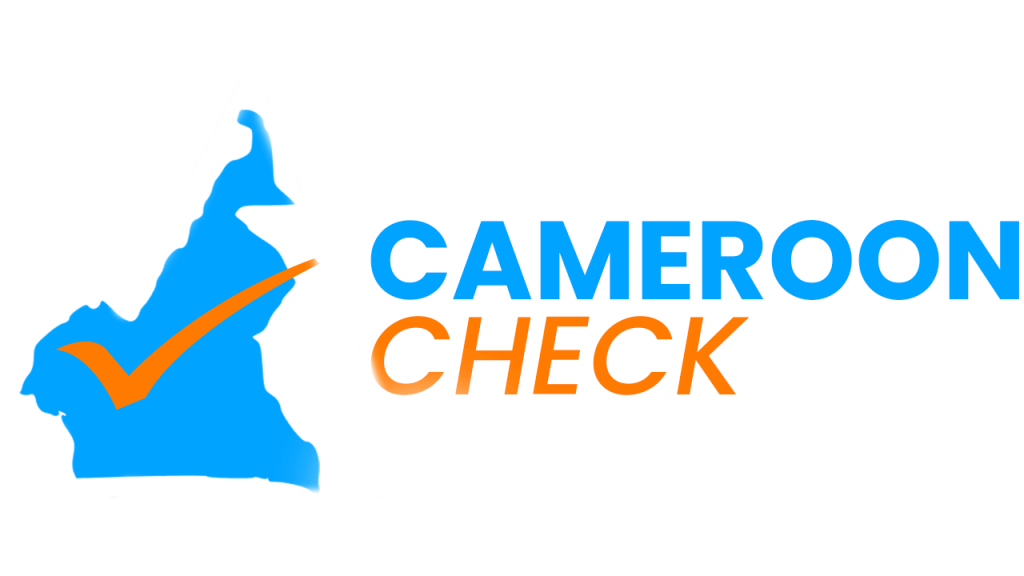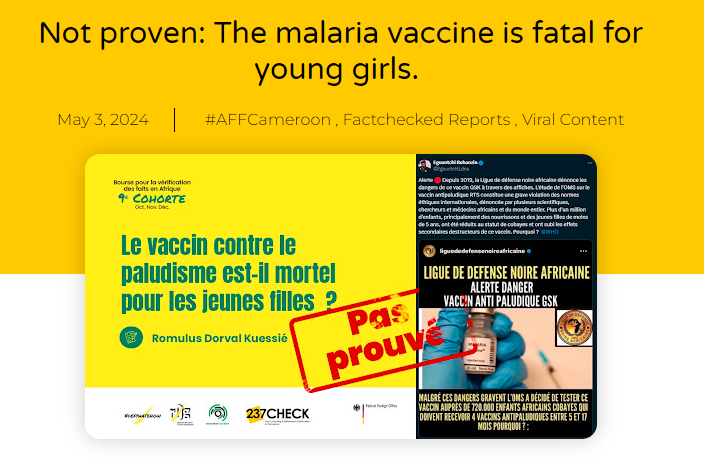Cliam: Strongly relayed on social networks since November 22, 2023, a publication by pan-Africanist activist Egounchi Behanzin indicated that the vaccine applied against malaria in Cameroon leads to the death of young girls who receive it.
Context
Cameroonian Minister of Health Manaouda Malachie announced on November 21, 2023 on his X account the receipt by Cameroon of 331,200 doses of the RTS Mosquirix vaccine against malaria. The government member specified that Cameroon was becoming a pioneer in the fight against a disease responsible for 70% of deaths among children. In reaction to this announcement, the pan-Africanist Egounchi Behanzin increased his outings on social networks to defend the use of this vaccine.
In a tweet on November 22, 2023, he indicated that tests carried out by the pharmaceutical laboratory GSK on more than a million child guinea pigs in Ghana, Malawi, Kenya etc. revealed that the RTS Mosquirix vaccine causes cases of meningitis as side effects, particularly in young girls. A publication which has accumulated more than 4,500 views and 42 shares. He made more than three other tweets, each with at least 1,500 views, with a Youtube video posted on the “African Black Defense League” channel watched more than 4,300 times.
Egounchi Behanzin warns Cameroonians by citing a study which justifies his fear. In the same sense, he indicates that the receipt of these vaccines by Cameroon is the result of a conspiracy between the Health Organization (WHO), the Vaccine Alliance, Gavi and the pharmaceutical laboratory GSK. He affirmed that the WHO has only given authorization for the use of this serum in Africa. He is joined in this logic by the Cameroonian researcher Dr Albert Ze. “Our leaders accept this umpteenth deception because many will still eat behind but it is in no way to fight against malaria.” tweeted the health economist . We contacted him on X to find out if this was the bottom of his thoughts. “I have already said it since then that this vaccine is practically useless,” the Doctor replied.
Publications which immediately led some Cameroonians to be wary of this vaccine. The WHO estimates that around 11,000 people die from malaria every year in Cameroon. Questioning a vaccine that can save many lives in Cameroon can be a real source of panic and health insecurity for populations increasingly affected by malaria. “It is obligatory to refuse these vaccines, Cameroonian people, Africans are not guinea pigs.” wrote an Internet user named Lamine Seck. An opinion shared by another named Marius Miafo who wrote that it is indeed this famous GSK vaccine. They want to kill our children in Cameroon.” can we read on the social network X in reaction to these conclusions given about the vaccine.
In reality, Cameroonians can choose death by systematically seeing the malaria vaccine as a danger for their children in view of this alert.

Verification
We proceeded to verify this assertion in four steps. From the outset, we consulted the publication of the specialized platform science.org that Egounchi Behanzin cites as the main source of his alert on the RTS Mosquirix vaccine. Contrary to the assertions of the pan-African activist, this is a press article and not a study carried out on the vaccine. The publication entitled “First malaria vaccine reduces child deaths, Final evaluation brings good news on RTS,S deployment”, this analysis actually discusses the impact of the vaccine on the children. The article written by Meredith Wadman indicates that trials have been carried out on the vaccine and reports that it “reduced the number of deaths among young African children by 13% over a period of almost four years. The vaccine also reduced severe cases of malaria by 22% in children who received a series of three injections,” the publication specifies. While the author reveals doubts in the scientific community about the vaccine’s effectiveness without repercussions, she generally believes that the vaccine is promising.
We subsequently contacted by call and via the WhatsApp social network Dr Christelle Mpoulet who is a Field Epidemiologist serving at the Cameroonian Ministry of Public Health. The specialist recognizes that there are cases of meningitis which have actually been observed in children who had received the vaccine. “But on the one hand, it was in a very small proportion; of the order of approximately one case of meningitis per thousand people who received the vaccine. On the other hand, the causal relationship has not been clearly and universally established.”, told us the specialist who also continued by indicating that vaccines have rigorous stages in their manufacturing process that they follow. “The most important reason for validation is that the benefit-risk ratio is strongly in favor of the vaccine. The effects observed on different types of populations differ. In view of this, adjustments are made by the competent authorities.” indicated Dr Christelle Mpoulet who considers that the RTS,S Mosquirix vaccine is not to be feared .
At the same time, we tried to find out the arguments which pushed the Ministry of Public Health to adopt this vaccine. In a publication made on its Facebook page on November 29, 2024, the institution provided some insight. Between the lines of the document, we learn in particular that “the most common adverse effects include: fever (27% of cases), irritability (14%), pain at the injection site (16%), swelling at the injection site (0.7%)”. The Ministry does not speak of meningitis or death. It specifically states that “the clinical research phase involved five randomized clinical trials in 7 African countries involving 15,459 children followed for 5 years. The demonstration phase was conducted in Kenya, Ghana and Malawi with 1.7 million children vaccinated. It will prevent each year, depending on the coverage rate, nearly 2,000 deaths among children under 5 years old.”, we can read.
We then consulted a report from the World Health Organization on the issue published in 2021. The statistical document shows that possible risks disappear when the vaccine is administered on a large scale. According to a series of questions and answers from the WHO published on January 17, 2024, a new vaccine called R21 will soon be prequalified like RTS,S. The UN organization estimates that the two vaccines could prevent 75% of malaria attacks when administered seasonally in areas of highly seasonal transmission where chemoprevention of seasonal malaria is ensured. The large-scale deployment of these anti-malaria vaccines could save tens of thousands of children each year according to the WHO. The entity that approved the vaccine is not talking about its dangerousness; The main concern of the World Health Organization is linked to the cost of the vaccine. It is still raised to be quickly distributed to all the needy. This is why she is working for the prequalification of the second vaccine.
Additionally, regarding the cases of deaths reported by Pan-Africanist Egounchi Behanzin in countries where the vaccine was administered in 2019, including Burkina Faso, Gabon, Ghana, Kenya, Malawi, Mozambique and Tanzania, a WHO report informs us that these countries are not systematically the most affected by cases of death following the vaccine. Indeed, according to the organization, in 2022, a little more than half of deaths due to malaria in the world were recorded in the four African countries: Nigeria (26.8%), the Democratic Republic of Congo ( 12.3%), Uganda (5.1%) and Mozambique (4.2%). These countries which are part of the WHO Malaria Vaccine Implementation Program (MVIP) have not made any report to date to decline the malaria vaccine.
On the same question, a fact-checking article published on January 19 on the Yoheda health solutions platform shared the assessments of Renaud Piarroux Professor at Sorbonne University, specialist in epidemics. The expert indicates that it is difficult to have complete faith in vaccines, before concluding that “The 1st version of the RTS.S vaccine is very modestly effective.”, he indicated.
The vaccine
The RTS Mosquirix vaccine is a vaccine based on recombinant protein like the vaccine against viral hepatitis B and was designed in 1987 by researchers from the British laboratory GlaxoSmithKline (GSK) in collaboration with African researchers such as Cameroonian Professor Rose LEKE. This malaria vaccine was first recommended by WHO to prevent malaria in children in October 2021. Since 2019, almost 2 million children have been vaccinated in Ghana, Kenya and Malawi under the Malaria Vaccine Implementation Program (MVIP). The introduction of the RTS, S malaria vaccine in the 3 pilot countries has had a considerable impact, reducing the number of pediatric hospitalizations for severe malaria and saving lives according to the WHO. The RTS,S malaria vaccine was prequalified by WHO in July 2022; which made it marketable internationally.
The 18 million doses available for the period 2023-2025 have been allocated to 12 countries, prioritizing areas with the highest needs, where the risk of malaria morbidity and mortality among children is highest, until vaccine supply increases to fully meet demand. The 331,200 doses received on November 21, 2023, cost the State exactly 39,744,000 FCFA according to the Ministry of Public Health. Note that the malaria vaccine must be administered according to a 4-dose schedule to children from the age of 5 months.
Verdict
Having gone viral on the social networks Facebook Youtube and After verification, we can say that this assertion has no scientific basis. So it’s not proven.
By Romulus Dorval Kuessié, #AFFCameroon cohort 9 scholarship holder
Other Fact Checks From Cameroon Check check (click the hyperlink on Cameroon Check)

